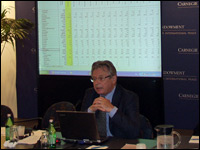Registration
You will receive an email confirming your registration.
IMGXYZ784IMGZYXProfessor Valery Tishkov, a visiting scholar at Carnegie's Russia and Eurasia Program, gave a presentation focusing on the demographics of Russia today and the social and political implications of developments in this area. He argued that Russia has been largely successful in protecting indigenous peoples and consolidating ethnic and religious minorities into a broad vision of a civic, multi-ethnic Russian nation.
He asserted that the demographic decline in Russia is not as steep or dangerous as commonly portrayed, noting that Ukraine has experienced a similar drop in population without attracting the kind of dire speculation that has attached itself to Russia. Ethnic Russians continue to make up an overwhelming majority of the country's population, he said, and give no sign of losing their majority status in the foreseeable future.
Professor Tishkov also spoke about the problem of xenophobia, noting that increased migrations and the perception among ethnic Russians that they are deliberately targeted for attacks in the Caucasus region have fueled ethnic tensions. Groups such as the Eurasianists have sprung up to highlight those they see as "betrayers" of the interests of ethnic Russians. He said that more needs to be done on the governmental level to mitigate xenophobia.
To this end, Professor Tishkov concluded, it is necessary to take seriously the idea of a civic Russian nation.
